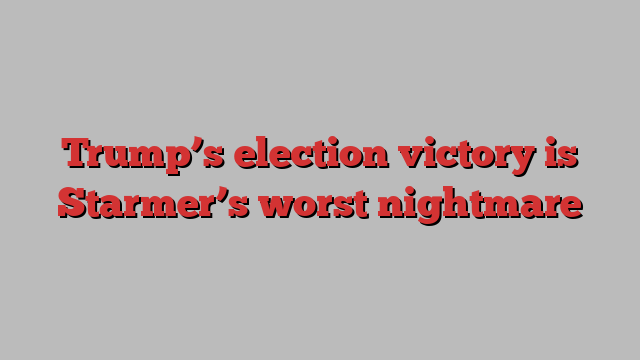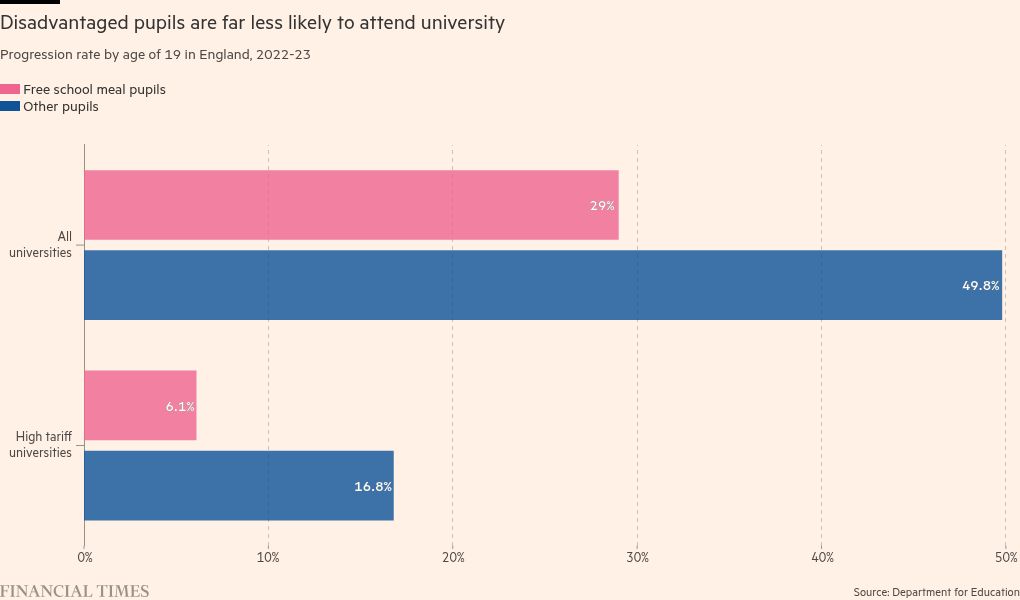
This article is an on-site version of our The State of Britain newsletter. Premium subscribers can sign up here to get the newsletter delivered every week. Standard subscribers can upgrade to Premium here, or explore all FT newsletters
Good afternoon. It was the outcome that the Starmer administration was praying — hope against hope — wouldn’t happen, but Labour’s promise to reboot Britain’s industry and economy now coincides with Donald Trump’s return to the White House.
The short analysis of what this means is that an already difficult outlook is made even more challenging as the prospects of US demands for higher European defence spending and a global trade war weigh heavily on growth.
Even before Trump was elected on Tuesday night both the independent Office for Budget Responsibility and the Institute for Fiscal Studies were sceptical that chancellor Rachel Reeves could stick to her spending forecasts. Those now look even more tenuous than they did.
Reeves was putting on a brave face at the Treasury select committee yesterday, insisting she will not “be coming back with more tax increases” this parliament, but economists’ prognosis for Trump 2.0’s impacts on the UK is bleak.
The National Institute of Economic and Social Research think-tank warns that Trump’s plan to put up to 20 per cent tariffs on imports across the board — and 60 per cent on Chinese goods — could halve the UK’s already anaemic growth forecasts.
NIESR modelled the impact of a 10 per cent tariff on UK exports to the US and found it would cause the annual UK GDP growth rate to more than halve in 2025, from its current forecast of 1.2 per cent down to 0.4 per cent — with an even larger hit in 2026.
This, the think-tank explains, is because tariffs would create higher prices for consumers (who buy fewer goods for more money), increase inflationary pressures and mean higher input costs for UK manufacturers — for example, Chinese chips used in US circuit boards in cars made in the UK get more expensive.
“Tariffs work like a tax on consumption,” says Ahmet Kaya, NIESRr’s principal economist. “They hit lower-income households the hardest because they spend more of their income on basic goods and services. Trump’s proposed tariffs would be yet another shock to the UK economy.”
Tariffs are also not the only challenge, warns Marco Forgione, director-general of the Chartered Institute of Export and International Trade, who says that Trump’s approach to the net zero transition is also going to create headaches in many boardrooms.
Putting the brakes on ESG
Forgione predicts greater pressure on the UK to reduce its commitment to the environmental, social and governance agenda and net zero ambitions in stark contrast to the approach being taken by the EU. Companies, he says, are already seeing this from Republican-controlled states in the US.
“Members have told me about cases already being brought by Republican states against UK businesses for implementing ESG. This divergence is only likely to increase under a Trump administration with the Republicans controlling the Senate and likely to control the House too,” Forgione adds.
It is too early to say exactly how Trump will follow through on his tariff threats but this FT interview with Scott Bessent, the hedge fund manager tipped as possible Trump treasury secretary, points to some nuance although the overall impact is going to be negative.
And if we do get a trade war, then the reality of Brexit means the UK will find itself “piggy in the middle” between the US and the EU, the two trading powers that account for two-thirds of total UK trade.
As former UK trade department official Allie Renison, now at consultancy SEC Newgate, tells me, that will leave the UK facing some potentially invidious choices on both foreign policy and trade relations.
“Depending on how Trump follows through on his tariff proposals, they will have to decide whether to club up with the EU on any retaliation, or hope that going it alone means the UK is spared from his wandering tariff eye or gets further bilateral engagement,” she said.
Tricky choices
But moving closer to Trump, either by toughening trade policy towards China or restarting efforts to strike a bilateral trade deal with Washington, is likely to have knock-on effects on London’s nascent attempts to reset trade ties with Brussels. It’s a world of tricky choices.
There will be some, like Mark Leonard, the director of the European Council on Foreign Relations, who argue that the Trump victory presents an opportunity for Brussels to make a “a big, bold offer to the UK to create a new partnership”, with Starmer reciprocating across all areas of security, including nuclear deterrence. I’m sceptical that that is the current direction of travel on both sides.
Trump is likely to make the EU turn inwards and, insofar as there is more defence spending, there will be pressure to spend it in America. The Anglo-French track in Nato will be vital, but I suspect will ultimately prove tangential to the wider EU “reset” discussion which is already struggling to cohere into a strategic platform for a new relationship.
At the same time, Reeves and Starmer are likely to be under pressure from Washington to say how they will put the UK on track to spend 2.5 per cent of GDP on defence — which will make Reeves’ promise not to raise more taxes harder to keep and make the coming spending review even more difficult.
British diplomats, politicians and officials have done their very best to prepare for Trump but the harsh reality is that his return to the White House puts immense pressure on Labour’s already squeezed domestic reboot.
Are you enjoying The State of Britain newsletter? Sign up here to get it delivered straight to your inbox every Thursday. Do tell us what you think; we love hearing from you: [email protected]
Britain in numbers

There was a post-budget surprise this week when education secretary Bridget Phillipson announced that she was allowing the £9,250 university tuition fee to rise in line with RPIX inflation (3.1 per cent) this year to £9,535.
University bosses naturally welcomed the move, but the £390mn that the Institute for Fiscal Studies calculates it will generate will almost entirely be gobbled up by the additional £372mn that universities will now be paying in employers’ national insurance.
Phillipson limited the rise to one year, adding that it was conditional on universities doing more to “boost access for disadvantaged students” which — as this week’s chart shows — still lags that of better-off pupils, particularly in the top-end universities.
Of course, one barrier to higher education for poorer students is the fact that maintenance loans haven’t kept up with inflation. And yet, the RPIX increase announced by Phillipson to maintenance loans does “little to reverse” the cuts imposed since 2020-21, according to the IFS.
The result, as this alarming analysis by the Higher Education Policy Institute showed last year, is an increasingly two-tier university experience: those with financial support from their parents can enjoy clubs and trips to the bar, while poorer students are left working too many hours and can’t make the most of their time as undergraduates.
There had been some hope that a Labour government might even reintroduce maintenance grants for the very poorest, but with the fiscal outlook darkening by the day (see above) that seems a very long way off.
The State of Britain is edited by Gordon Smith. Premium subscribers can sign up here to have it delivered straight to their inbox every Thursday afternoon. Or you can take out a Premium subscription here. Read earlier editions of the newsletter here.
Recommended newsletters for you
Chris Giles on Central Banks — Your essential guide to money, interest rates, inflation and what central banks are thinking. Sign up here
Swamp Notes— Expert insight on the intersection of money and power in US politics. Sign up here